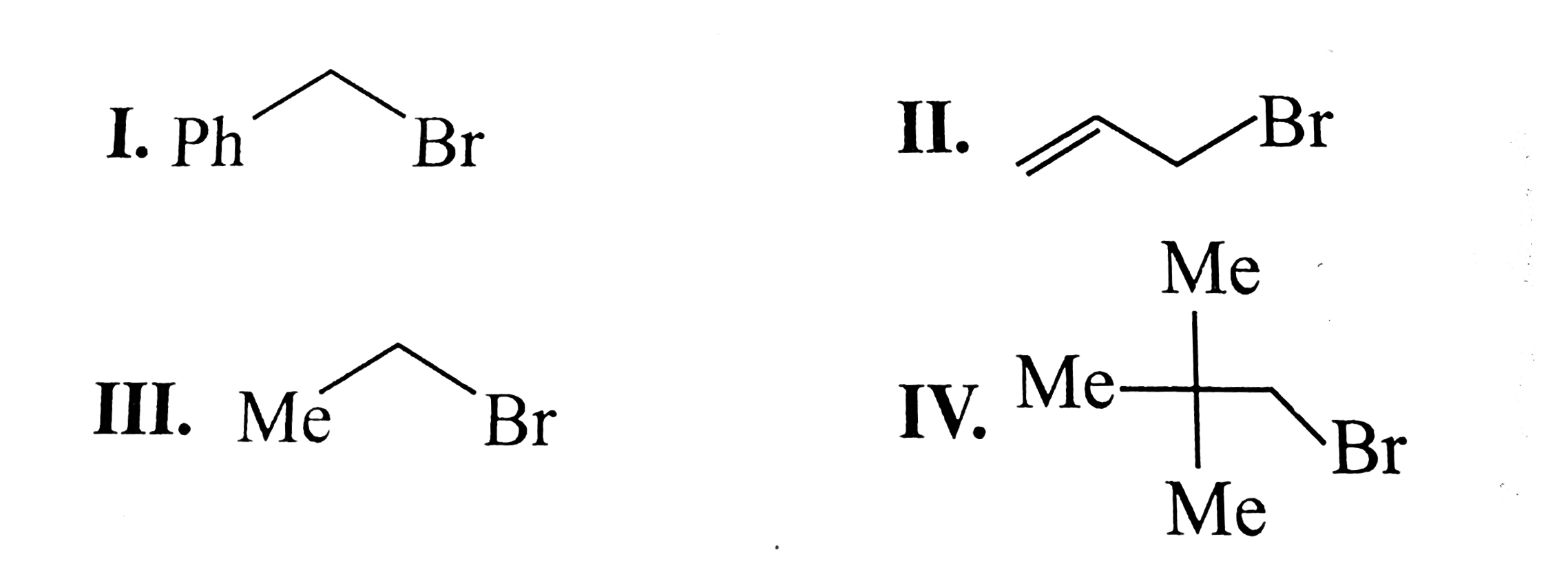SN reaction is given by these compounds, which have a nuclophilic group and a good leaving EWG. It should be stable after leaving with bonding pair of ¯e's and it should have high polarisability.
Nucliphilic aliphatic substituion reaction is mainly of two types SN−1 and SN2.SN−1 mechanism is a two step process. Reaction velocity of SN−1 depends only on the concentration of the subtrate. It proceeds via the formation of carbocation, optically active substrate gives (⊕) and (o−) froms of the product.
In most of the cases, the product usually consists of 5−20% inverted and (95−80%) racemised species. The more stable is the carbocation, the greater is the propotion of racemission. In solvolysis reaction, the more nucleophillic is the solvent, the greater is the proportion of inversion.
Which of the following gives SN1 reaction?

Select the correct answer.
(I),(II) and (III)
(I) and (II)
(II),(III), and (IV)
(I),(III), and (IV)
The correct Answer is:b
Stabiliy of carbocation: Benzyl C⊕>AllylC⊕>3∘C⊕(I)>(II)
(IV) gives Me3−⊕CH2 (neopntyt, C⊕) (sterically hindered). It undergoes neither SN−1 nor SN^(2).
Topper's Solved these Questions
- BOOK - CENGAGE CHEMISTRYCHAPTER - AROMATIC COMPOUNDS AND ALKYL AND ARYL HALIDES EXERCISE - Exercises Linked Compreshension58videos
AROMATIC COMPOUNDS AND ALKYL AND ARYL HALIDES
- BOOK - CENGAGE CHEMISTRYCHAPTER - AROMATIC COMPOUNDS AND ALKYL AND ARYL HALIDES EXERCISE - Exercises Multiple Correct35videos
AROMATIC COMPOUNDS AND ALKYL AND ARYL HALIDES
- BOOK - CENGAGE CHEMISTRYCHAPTER - AROMATIC COMPOUNDS AND ALKYL AND ARYL HALIDES EXERCISE - Exercises Concept Application4videos
AROMATIC COMPOUNDS AND ALKYL AND ARYL HALIDES
- BOOK - CENGAGE CHEMISTRYCHAPTER - APPENDIX INORGANIC VOLUME 2EXERCISE - Short Answer Type179videos
APPENDIX INORGANIC VOLUME 2
- BOOK - CENGAGE CHEMISTRYCHAPTER - BIOMOLECULESEXERCISE - Exercises Archives (Analytical And Descriptive)8videos
BIOMOLECULES
Similar Questions
SN reaction is given by these compounds, which have a nuclophilic group and a good leaving EWG. It should be stable after leaving with bonding pair of ¯e's and it should have high polarisability.
Nucliphilic aliphatic substituion reaction is mainly of two types SN−1 and SN2.SN−1 mechanism is a two step process. Reaction velocity of SN−1 depends only on the concentration of the subtrate. It proceeds via the formation of carbocation, optically active substrate gives (⊕) and (o−) froms of the product.
In most of the cases, the product usually consists of 5−20% inverted and (95−80%) racemised species. The more stable is the carbocation, the greater is the propotion of racemission. In solvolysis reaction, the more nucleophillic is the solvent, the greater is the proportion of inversion.
Which of the following will give SN reaction?View SolutionSN reaction is given by these compounds, which have a nuclophilic group and a good leaving EWG. It should be stable after leaving with bonding pair of ¯e's and it should have high polarisability.
Nucliphilic aliphatic substituion reaction is mainly of two types SN−1 and SN2.SN−1 mechanism is a two step process. Reaction velocity of SN−1 depends only on the concentration of the subtrate. It proceeds via the formation of carbocation, optically active substrate gives (⊕) and (o−) froms of the product.
In most of the cases, the product usually consists of 5−20% inverted and (95−80%) racemised species. The more stable is the carbocation, the greater is the propotion of racemisation. In solvolysis reaction, the more nucleophillic is the solvent, the greater is the proportion of inversion.
For the reaction

which substrate will give maximum racemismision ?View Solution
Knowledge Check
- Question 1 - Select One
SN reaction is given by these compounds, which have a nuclophilic group and a good leaving EWG. It should be stable after leaving with bonding pair of ¯e's and it should have high polarisability.
Nucliphilic aliphatic substituion reaction is mainly of two types SN−1 and SN2.SN−1 mechanism is a two step process. Reaction velocity of SN−1 depends only on the concentration of the subtrate. It proceeds via the formation of carbocation, optically active substrate gives (⊕) and (o−) froms of the product.
In most of the cases, the product usually consists of 5−20% inverted and (95−80%) racemised species. The more stable is the carbocation, the greater is the propotion of racemission. In solvolysis reaction, the more nucleophillic is the solvent, the greater is the proportion of inversion.
Which of the following will give SN reaction?AR−BrBR−N3CR−O⊕H2DAll - Question 2 - Select One
SN reaction is given by these compounds, which have a nuclophilic group and a good leaving EWG. It should be stable after leaving with bonding pair of ¯e's and it should have high polarisability.
Nucliphilic aliphatic substituion reaction is mainly of two types SN−1 and SN2.SN−1 mechanism is a two step process. Reaction velocity of SN−1 depends only on the concentration of the subtrate. It proceeds via the formation of carbocation, optically active substrate gives (⊕) and (o−) froms of the product.
In most of the cases, the product usually consists of 5−20% inverted and (95−80%) racemised species. The more stable is the carbocation, the greater is the propotion of racemission. In solvolysis reaction, the more nucleophillic is the solvent, the greater is the proportion of inversion.
Fugacity power of which group will be maximum?ACH3−O−O∣∣S∣∣O−C2H5BCH3−O−O∣∣S∣∣O−CH3C DCH3−O−O∣∣C−CH3
DCH3−O−O∣∣C−CH3 - Question 3 - Select One
S1N reaction is favoured by
ANon - polar solventsBBulky alkyl groups on the carbon atom attached to halogen atomCLess steric hindrance containing akyl halidesDLess stable carbocation
SN1 Reaction
View SolutionSN1 and SN2 mechanisms
View SolutionWhich of the following compounds gives SN1,SN2 and SN2 mechanisms?
View SolutionPredicrt the order of reactivity of the following compounds in SN1 and SN2 reactions.
 View Solution
View SolutionWhich of the following compounds gives SN1,SN2 and SN2 mechanisms?
View Solution

